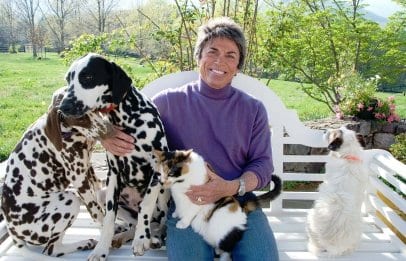At the 27th annual Lambda Literary Awards held in New York City last month, novelist Rita Mae Brown was given the Pioneer award for her decades of lesbian literature, notably her classic 1973 coming-of-age novel Rubyfruit Jungle. It’s not an honour she seemed to want.
“I don’t think that way,” she told the Washington Post, “I love language, I love literature, I love history, and I’m not even remotely interested in being gay.”
In her long career, it’s that sort of frank contrariness that’s made Brown as many enemies as friends, but it’s a quality deeply ingrained. She was expelled from the University of Florida in 1963 for her activism around racial integration but insists that was merely the official line. It was actually her “pansexuality,” she told People magazine in 1982, that got her kicked out, after she ranted at the dean for warning her not to be seen dating black women on campus:
“‘I don’t care if I fall in love with a black or a white or a man or a woman or an old or young person. I just care that they have a good heart.’ Within an hour I was in the dean’s office being told I was a neurotic and a lesbian and demented. That was it. I was out. My world fell apart.”
Brown’s sexuality made her an outlaw in the National Organization for Women (NOW) too, as she once infamously stood up at a meeting and declared, “I’m tired of hearing everyone moan about men. Say something good about women. I’ll say something good. I love them. I’m a lesbian.”
She’s featured in the new documentary film She’s Beautiful When She’s Angry, documenting the early days of the 1970s Equal Rights Amendment activism and her clashes with NOW leader Betty Friedan, who eventually apologized to Brown decades later.


This rubs many people the wrong way, but her contributions to queer equality remain intact, like her rant in another section of Rita Will: “Nobody cares about gay people. Black folks don’t want their queers, white people can’t stand theirs. Rich people send theirs to psychiatrists. Poor people kick theirs out on the street. Nobody wants us. I want us. We’ve got to stand up for one another.”
With her classic bestseller finally getting a long-overdue and sassy new cover this summer, it’s hoped that a whole new generation will discover Brown’s fabulous antihero Molly Bolt and her grumpy creator.
“I hope people get over calling me ‘Rita Mae Brown, the lesbian author,’” she insists, “I want them to remember me as ‘Rita Mae Brown, author.’ And I hope they say, ‘She was fun.’”
(Photo: Mary Motley Kalergis/Washington Post)


 Why you can trust Xtra
Why you can trust Xtra


